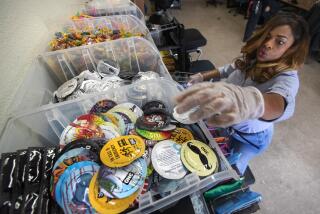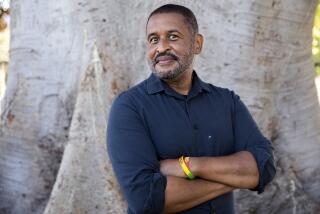NORTH HOLLYWOOD : Condom Man Takes Message to ‘Homeboys’
- Share via
Condom Man, the young men call him. But 25-year-old Demetrius Navarro dispenses a lot more than prophylactics when he visits the San Fernando Valley’s barrios and housing projects, alternative high schools and gang truce meetings.
Navarro is a trained peer counselor for the Valley Community Clinic’s teen-age pregnancy prevention program.
Currently the lone man among the clinic’s many women peer counselors, Navarro is training three other young men to counsel teen-age boys about preventing pregnancies and protecting themselves against sexually transmitted disease.
Yet, for Navarro, the real work can’t be done at the clinic in North Hollywood. He can often be found hanging out with the guys who he says have been passed over by sex education classes and have no reason to seek information in a clinic. So Navarro takes the information--and the condoms--to them.
“Most of the concern and the programs about teen sex and pregnancy and stuff focus on the girls,” Navarro says. “Guys are left out of it and develop this attitude like, ‘OK, I guess it’s really not my problem.’ ”
Passing out condoms is a way to get them talking and encourage them to think about the consequences of having sex, says Navarro, an actor.
The young men he counsels seem to agree. Andy Thornton, 17, chatted with Navarro after a presentation at Independence Continuation High School in Van Nuys Thursday.
“I think guys do feel left out,” Andy said. “All of the posters and everything telling you to be careful show girls, you know, and sometimes their babies.”
Health officials readily admit that a young man’s role in sexual issues has been easier left unresolved.
“Most agencies and clinics and counselors have given up on young men without ever even starting to try,” said Dr. Jane Kramer, a Bay Area researcher contracted to evaluate the teen-age pregnancy programs that receive funds from the Los Angeles Regional Family Planning Council.
“Programs like this are extremely rare,” Kramer said, as she sat in on Navarro’s talkfest at Pacoima’s San Fernando Gardens housing project this week.
“This is very powerful,” she said of Navarro’s work. “He is a peer, but more. He can offer not only information, but a relationship to these guys. We’ve seen here the potential spreading-out effect.”
Indeed, as Navarro met with Oscar Chapu, a 17-year-old Pacoima high school student, Chapu talked to Navarro about conversations spurred with his friends and girlfriend by their last visit.
Navarro talks with young men like Oscar in their own language. He can say ‘homeboys’ and ‘old lady’ without sounding phony. And although sex and values is the focus, his conversations with these young men drift into talk about career choices, gang pressures, and other risk factors.
He explained to Oscar the added dangers of fighting in the age of AIDS.
“Say you’re throwing down with somebody. You probably land a good one and it busts their lip. Or their nose. And blood is everywhere. And you probably split your knuckle. Well, that is blood-to-blood contact. If that person is HIV-positive, you are putting yourself at a big risk for infection.”
“Whoa,” young Oscar said. “For fighting? I never heard anyone say that before.”
Navarro doesn’t miss a beat, launching into another round of what the those at the clinic call “values clarification.” Before Oscar leaves the borrowed office space, he asks for some clinic information for his “old lady.” He says he doesn’t need any more condoms, but Navarro hands him a long strip of them anyway; maybe his “homies” need some.
“I know where these boys are coming from,” says Navarro, who grew up in Pacoima and whose older brother served four years in prison for a gang killing.
“I know the reception that awaits someone who thinks ‘I’m coming to help the poor kid in the barrio.’ . . . They know I will be back week after week.”
More to Read
Sign up for Essential California
The most important California stories and recommendations in your inbox every morning.
You may occasionally receive promotional content from the Los Angeles Times.













